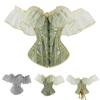


Stepping into the lingerie market with your own private label brand means finding a manufacturer.
Stepping into the lingerie market with your own private label brand means finding a manufacturer that aligns with your vision, quality expectations, and production capacity. But the process isn’t just about getting products made—it’s about creating a foundation for reliable production and brand consistency.
Working with lingerie manufacturers can be simple if you know what to ask and how to evaluate the right fit for your business. Here’s what really matters when choosing a factory or vendor.
Start by understanding how involved you want to be in the product design. If your brand just needs to put its label on pre-designed styles, a manufacturer offering private label or ODM (Original Design Manufacturing) services might be enough. But if you’re designing from scratch—down to fabric, fit, and trims—you’ll need OEM (Original Equipment Manufacturing) support, where your tech pack is followed closely.
Don’t assume every factory does both. It’s worth asking what level of design input they accept and whether they provide sampling before full production.
Minimum order quantities (MOQs) are a key point, especially if you’re testing a new product or launching in small batches. Most lingerie manufacturers require somewhere between 300 and 1,000 pieces per style, but you might find factories open to lower volumes at a slightly higher cost.
Ask upfront if they allow variation within an order, like mixing sizes or colors. It’s also helpful to know whether they offer small test runs before committing to larger bulk production.
Lingerie is all about fit, feel, and durability. Good manufacturers usually offer a variety of materials: lace, modal, spandex blends, mesh, bamboo, and even sustainable or recycled options. If you’re targeting comfort or eco-conscious buyers, request information on certifications like OEKO-TEX, GOTS, or GRS.
It’s smart to request fabric swatches before production. Feel and stretch can vary significantly between samples and final products, so clarity at this stage helps avoid surprises.
Whether you’re selling online, in boutiques, or to wholesalers, working with compliant manufacturers is non-negotiable. Look for suppliers with certifications like ISO 9001 for quality assurance. For social and labor standards, BSCI or SEDEX reports add confidence that you’re sourcing responsibly.
If you plan to sell in regulated markets, ask about safety and chemical compliance like REACH or RoHS. These details help prevent future disruptions and support long-term credibility.
When it comes to private label production, branding can’t be an afterthought. The right manufacturer should help you bring your identity into every detail—care labels, printed tags, custom packaging, even branded zipper pulls or hook & eye closures.
Some factories also assist with packaging design or offer barcoding, which helps if you’re going into retail or wholesale distribution. Ask to see examples of previous branding work so you can gauge what’s possible.
Production lead times vary by manufacturer and order size. Typically, samples take about 2–4 weeks, and bulk orders require 4–8 weeks depending on complexity. If you’re on a tight launch schedule, make sure the factory offers rush options or staggered deliveries.
Don’t forget to clarify shipping terms (FOB, EXW, CIF) and whether the factory handles logistics or leaves that to you.
Many suppliers appear as manufacturers but are actually trading companies. This isn’t necessarily bad, but it’s something you should know early. Trading firms may offer broader sourcing options, but factories give you more control.
To find out, just ask: “Is your company a direct manufacturer or a vendor?” A quick video tour or production photo set can confirm what’s real. Transparency at this level helps build a smoother relationship.
Finding the right lingerie manufacturer is about aligning on product quality, brand needs, production scale, and trust. Don’t rush the selection process. Start conversations early, ask the right questions, and prioritize clarity over speed.
When you’re able to build a solid connection with your supplier, the result is more than just beautiful products—it’s a dependable supply chain that supports your brand’s long-term growth.
